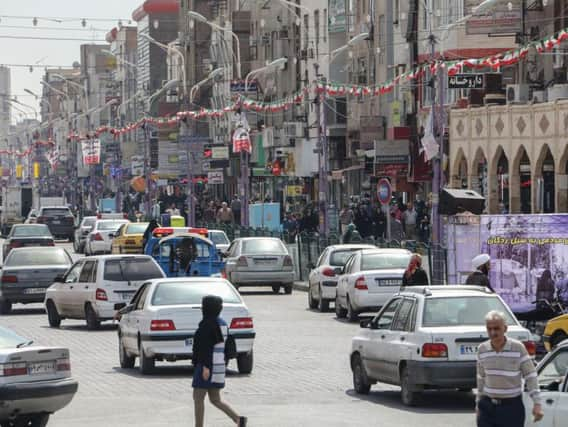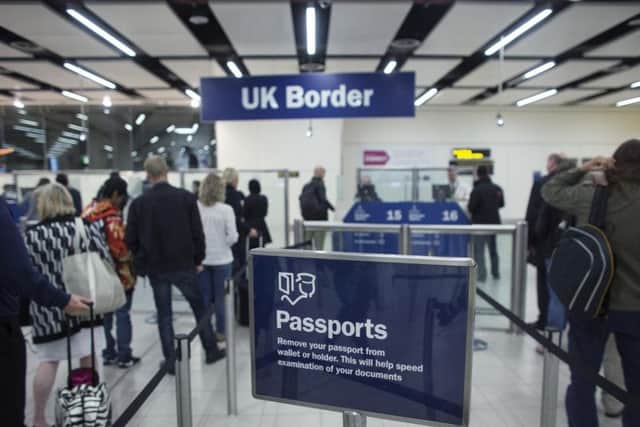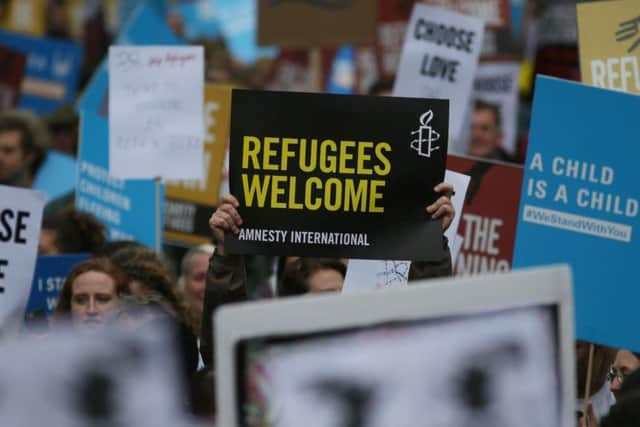How chance meeting with Leeds couple changed life of refugee who fled Iran for Yorkshire


The envelope that Hamed Shahrekani opens on Thursday will hold far more than just his A-level results. Whatever the grades inside, it will be symbolic - a representation of new beginnings after a journey the word traumatic can only begin to do justice.
The 20-year-old fled his homeland three years ago, leaving behind his family in Iran in fear of persecution. It was a long and difficult journey and one that for 10 weeks saw him holed up in a single room with nearly 70 other refugees, witnessing beating after beating and surviving on little more than scraps of toast and yoghurt.
Advertisement
Hide AdAdvertisement
Hide AdIt remained far from easy when he arrived in London in December 2016 and then went on to Yorkshire, as he grappled with new systems, a different way of life and a language not his native tongue, all the while coming to terms with the heartache that his parents were more than 3,000 miles away in Khorramshahr, the city in the Khuzestan Province where he had grown up.


‘Our Wakefield restaurant is a thanks for warm welcome we received after fleeing Eritrea’Political connections
“It’s a nice country to live in, but it’s difficult politically,” he reflects on Iran. He was born there in a village called Kharaj in 1999 to a family with political connections. His aunt had been killed whilst protesting against the Government in 1978 and he recalls his family being questioned over her actions several times during his early childhood.
Despite being born into a Muslim family, Hamed felt agnostic growing up. But in 2015, after performing a violin recital inside a church, the avid musician developed an interest in Christianity and later began attending a secret house church, introduced to him by a tutor.
Advertisement
Hide AdAdvertisement
Hide AdIn August 2016, authorities discovered its existence and Hamed still does not know what happened to those found congregating there at the time. He was alerted to the raid by the tutor, who advised him to leave.


“I was just 17 years old. I was shocked and scared. I didn’t know what to do really. He just told me 'do not go home tonight'. I was thinking in my mind maybe they will leave me if they find out how old I am, but I didn’t take the risk.”
YP Letters: Child refugees need our help once againChanging religion
Guidance by the UK Government, used to make decisions in asylum applications, states that Christians who have converted from Islam are considered apostates - a criminal offence in Iran and there are reports of some facing physical attacks, detention and torture. Members of house churches can be subject to harassment, arrest, surveillance and imprisonment by Iranian authorities, it says.
Advertisement
Hide AdAdvertisement
Hide AdFearing what might happen, Hamed fled to a nearby village to stay with a friend. The next day, his mother called to tell him police were at the family home searching for him and had found notes on Christianity in his bedroom. He told her everything.
Within days, Hamed travelled to Iran’s border with Turkey and then on to Istanbul. He spent 10 weeks there, crammed into a room with more than 60 Iranian and Afghan citizens. “When we were sleeping, I was being kicked in my face by people’s feet because it was really small. We were getting one meal a day, which was toast and a yoghurt and sharing that.”
He says many of those around him were getting punched and beaten as smugglers demanded more money. “It was horrible. I was really scared. I was worried I would be one of them.
Sometimes it was that scary that to feel hungry and to be missing my family and feeling lonely, would be the least thing I would think about.”
Advertisement
Hide AdAdvertisement
Hide AdSmugglers then provided Hamed with a ticket for a flight to London and on the plane, took away his passport and most of his belongings. On arrival in the country he went to border control and explained he had fled his nation. He was interviewed and sent to a children’s house in the capital.
Later on, while his case for asylum was being considered, Hamed was sent to a hostel in Wakefield and then given a room in a shared house in Bradford. “At the beginning, I was a bit scared because I didn’t know what to do. But I felt really welcomed and nobody ever did anything bad to me.
"The first few weeks was an upsetting time. I couldn’t believe it. I was missing my family and trying to process that I had been thinking ‘Am I going to be killed tomorrow? What’s going to happen to me in the following minutes?’ and had seen people being beaten up and not been able to do anything.”
Advertisement
Hide AdAdvertisement
Hide AdHamed’s refugee status was granted in June 2017 and he had 28 days to leave his asylum accommodation in Bradford and find somewhere else to live. He secured work at Safran, an Iranian restaurant in Leeds, and hoped to move to the city, but, unable to afford, a friend kindly offered him space to stay.
Life-changing meeting
Within a month, a chance meeting then changed his life. He had been called into work for an extra shift and began chatting with a couple who were in the restaurant after a theatre show they had planned to see was cancelled. Eric and Josie Liddell commented on Hamed’s grasp of English and he explained he had been learning in Iran and told them he wanted to continue his education.
Moved by what they learnt of his story that night, the couple invited Hamed to their home in the days that followed, in the hope they could in some way help him as he settled into life in the UK. Sat at their kitchen table, he recounted his experience and was left astonished when they offered him a room in their house. “I couldn’t believe it,” he says. “I felt tears coming out of my eyes. It was wonderful.”
Two years on Hamed still lives with the couple at their home on the outskirts of Leeds. They have supported him as he returned to education, studying A-levels in maths, physics, music and IT at Notre Dame College, and as he continued with employment, with jobs as a Deliveroo driver and at Five Guys restaurant, where he still works.
Advertisement
Hide AdAdvertisement
Hide Ad“I just really don’t know what to say to them. I can’t put into words how amazing it is and how kind it is. They just welcomed me into their house without asking for anything...Eric has helped me like a father here. He helped me write my personal statement for university and my CV so I could work and they have taught me how to live, the British style of living. I should give my life to those two to say thank you.”
Looking to the future
After he gets his results on Thursday, Hamed hopes to study aerospace engineering at the University of Manchester. But whatever happens, he is proud of how he has managed his difficult journey. “I was really excited to go back into education but it was a massive challenge,” he says.
“I was away from education for two years and then I was continuing with a different language, my second language. It was really hard at the beginning.
“I got very disappointed and thought I can’t do this. But I kept practicing and attending and eventually I was getting As and Bs. I was getting Us as well but I never got disappointed again. I never gave up. I was just going straight forward...When I am looking back, I feel proud of myself.”
Advertisement
Hide AdAdvertisement
Hide AdHe misses his family, desperately. His mother, father and brother still live in Khorramshahr and his father was questioned by the authorities after Hamed fled. He has met up with his family just once since he left, but he is grateful that technology enables him to see and speak to them.
He is grateful too for the support and welcome he has received here, claiming he owes his life to the British Government for granting him refugee status and that the UK now feels like his home.
Support for refugees
Back in June, data compiled by Citizens UK found Leeds and Bradford to be among the top 10 most welcoming cities for refugees, based on the number of people fleeing the Syrian conflict that had settled in the areas through the Government’s resettlement programme.
Across the county, there are support organisations for refugees from all backgrounds, and, like many others, Hamed says their kindness helped him to adjust and feel welcomed to life in the UK.
Advertisement
Hide AdAdvertisement
Hide AdAfter first joining a church in Wakefield, he was helped through the Leeds Diocesan Refugee Support Group, which brings together several projects offering everything from social care support, to accommodation, immigration advice, and food and clothing parcels to refugees and asylum seekers.
“It helps people to become integrated much more quickly and to feel a sense of purpose and belonging,” facilitator Lucy Irven says. “They should be able to live in safety and dignity and we can really help so that people feel supported and can be successful living here in this country.”
Similarly to the Leeds Diocesan group, Beacon, Bradford Ecumenical Asylum Concern, was set up out of a shared concern to address the needs of asylum seekers and refugees. The charity supports them through English classes, in the attending of asylum hearings, through a hosting scheme providing houses to destitute refused asylum seekers, and in helping people with no legal aid or representation.
Rosemary Mupunga, 50, was housed through the hosting scheme after fleeing Zimbabwe. She arrived in the UK in 2011 and started being supported by Beacon in 2016 when she did not have anywhere to live.
Advertisement
Hide AdAdvertisement
Hide AdThough her time in the UK has not been without trouble - she says she was attacked in Bradford in the street - Beacon helped her when she needed it most, providing a roof over her head for more than two years. “They really do make a difference to people’s lives,” she says. “I really appreciate that they consider you to be a human being and that they help you to get a roof over you.”
Empowering people
Team leader Katy Armitstead says that is part of Beacon’s ethos. “Many people are quite clearly traumatised,” she says. “That might be from whatever has occurred in their country but also from making the journey to the UK and there could be further trauma because of the system and the uncertainty they are facing. They don’t know what’s going to happen to them and whether they are going to get refugee status. The toll that can take on people’s mental health is quite significant.
“They are restricted from so many aspects of life that we take for granted and it can really hit people’s confidence and identity. We try to counteract that and treat people like humans. The welcoming side of it is really empowering in terms of mental health and helps them to manage and survive emotionally.
“I think it’s really powerful for people to feel that, although there are people in this country that might feel hostile towards them, there are people who do care and will welcome them and show understanding.”
Advertisement
Hide AdAdvertisement
Hide AdBeneficiaries at Meeting Point in Leeds, a project which offers hot meals, food parcels, clothing and household items, English classes, signposting services and a safe, socialising space to people at all stages of the asylum process, have experienced good and bad in Yorkshire.
Project manager Emma Crossley says some have faced hostility, experienced unprovoked attacks and had their homes targeted, whilst others have had a warm welcome from their local communities.
She says support from organisations and residents can reduce vulnerability and “the risk of radicalisation”. “It’s encouraging, it feels supportive and so you’re more likely to then integrate within your community and more likely to feel you can stay and feel safe.”